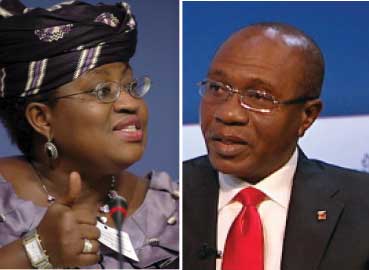Tomorrow, June 2, Godwin Emefiele assumes office as Central Bank of Nigeria (CBN) Governor on the crest of the furore over high monetary policy rate (MPR) consistently set at 12 per cent.
The CBN Monetary Policy Committee (MPC) retained the MPR at its last meeting in Abuja, against the background of a fairly stable economy. Stakeholders across economic sectors knocked it as ill-advised and insensitive.
The Lagos Chamber of Commerce and Industry (LCCI) sees tight monetary policy as the bane of the economy.
Importers described it as killing, stockbrokers said it stokes the long-drawn capital market meltdown and its many botched recovery attempts.
There is one central message in their outcry: Emefiele should discontinue the rigid monetary policy.
MPR is the rate at which banks borrow from the CBN to cover immediate cash shortfalls. The higher the cost of interbank borrowing, the higher the rate at which banks grant loans to the real sector.
The CBN’s 12 per cent interest on loan to commercial banks led to the current borrowing cost of between 20 per cent and 28 per cent to the manufacturing sector.
While the CBN sees its lending rate as appropriate, critics counter that it is stifling credit expansion and will ultimately cripple manufacturing.
There is the argument that crashing interest rate to a single digit is not economically healthy for an import dependent economy like Nigeria’s.
Critics argue that with a high MPR, the economy is being taken over by foreigners who obtain funds at cheaper cost at home and are able to invest in all sectors of the Nigerian economy more than domestic investors.
Lagos Chamber of Commerce and Industry (LCCI) Director General, Muda Yusuf, has warned that an inflexible monetary policy is counter-productive.
According to him, while many countries impacted by the 2008 global financial meltdown are working out measures to stimulate their economies, the CBN has tightened monetary policy to stabilise exchange rate.
Yusuf lamented that the manufacturing output in the first quarter of the year was dull because of the impact of micro and macro-economic factors.
His words: “The continuation of a tight monetary policy will have the following outcomes – persistent high interest rate, deepening unemployment, financial intermediation role of banks will continue to be undermined, recovery of the real economy will remain sluggish, the capacity of enterprises to create jobs will continue to be inhibited, stock market recovery will remain slow and the capacity of banks to support the economy will remain severely constrained.
“Such high cost of borrowing increases production cost and also makes made-in-Nigeria products uncompetitive against imported substitutes, which are generally aggressively supported with conversely lower single digit interest rates in export economies.”
Bestworth Assets and Trust Managing Director and Chief Executive Officer, Sola Adeniyi, said high interest rate means that investors will prefer fixed income instruments to equities which is partly why the capital market has stagnated since the crash in 2008.
According to Adeniyi, monetary policy should not be narrowed down to stabilising the exchange rate but used to stimulate the economy for growth and job creation.
He added: “When there is high interest rate as it were, many investors tend to go for fixed income instruments or put their money in interest yielding accounts.
“So what effect does that have on the financial system? The banking sector will be more liquid and they have more funds to lend out, regrettably, at high interest rate.
“But other investment instruments like stocks and equities suffer because investors go for the instruments with guaranteed high returns.”
Adeniyi said Emefiele should go beyond sustaining the legacies of his predecessor, Lamido Sanusi, and determine what the CBN really wants to achieve with MPR.
“Setting monetary policy rate and liquidity levels in the system can help determine a lot of things. The question is what they want to achieve with it. Stimulate growth in the economy by encouraging investment or just stabilise exchange rate and fight inflation?
“Why are deposit money banks not lending to manufacturers? If they have fears or challenges, how can the CBN mitigate those challenges?
“What do they (CBN) need to put in place to make the banks lend more to manufacturers so that there could be more production and expansion which will create employment opportunities?
“More employment opportunities mean that more people will be employed, and the cycle continues. These are the issues the CBN monetary policy committee can address using its policy decisions. Not just fighting inflation,” Adeniyi argued.
Association of Micro-Entrepreneurs of Nigeria President, Saviour Iche, described the 12 per cent MPR as “destructive to indigenous businesses as some deposit money banks charge between 19 per cent 25 per cent interest rate on loans given to MSMEs.”
According to him, tough access to credit facilities does not create room for micro, small and medium enterprises (MSMEs) to grow and it negatively affects Nigerian industrial development.
The recent annual general meeting of the Manufacturers’ Association of Nigeria (MAN) called on Abuja to reduce inflation and interest rates by formulating good monetary policies.
Isaac Agoye, Chairman of the over 600-member strong Ikeja branch of MAN, insisted that steady industrialisation, increasing employment opportunities as well as enhanced social welfare will only be possible with lower interest rate.
Stakeholders wonder whose interest MPR is serving, that of the economy or the CBN.
The task before Emefiele is whether to stimulate economic growth by encouraging investment or just stabilise exchange rate and fight inflation by mopping up excess liquidity.
















